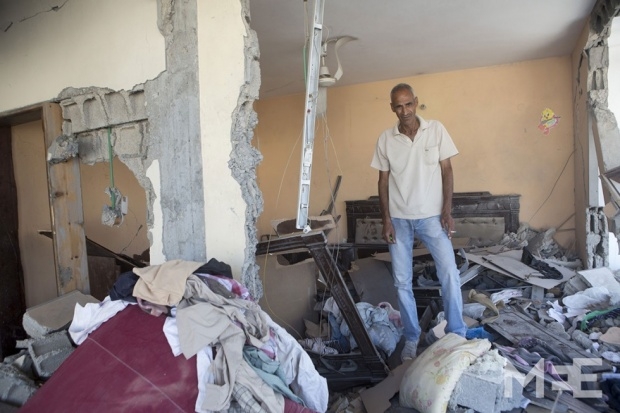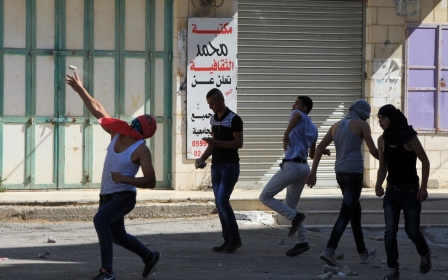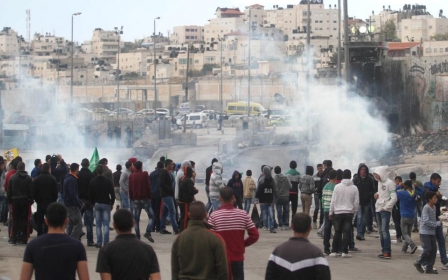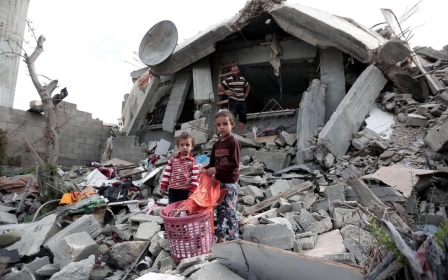Imperialist interference delaying Gaza’s reconstruction

Almost two months following the Egyptian-brokered ceasefire, Palestinians in Gaza have been rendered invisible through the usual tactic of eliminating political responsibility and accountability from the humanitarian arena. The vast destruction wrought by Israel seems destined to remain confined to a series of discussions and negotiations that will ensure absolute US and UN control through the Palestinian Authority’s collaboration, in accordance with Israel’s plans for further humanitarian deterioration.
Foreign interference sought by the PA has been evident since the commencement of this year, when PA President, Mahmoud Abbas, suggested the indefinite presence of NATO troops for border control of a hypothetical future Palestinian state. Notably, the acquiescence to NATO involved talk of Palestinian demilitarisation - an issue that featured prominently within the context of Israel’s latest colonial massacre under the euphemism of “Operation Protective Edge.” In February 2014, Abbas was quoted by Haaretz as stating: “We will be demilitarised. Do you think we have any illusion that we can have any security if the Israelis do not feel they have security?”
Israel’s alleged security concerns framed most of the hegemonic narrative disseminated by international organisations such as the United Nations, as well as mainstream media. With Israel metamorphosing colonial violence into alleged defence by utilising Hamas’ tunnel network as a primary reason for the committed atrocities, the issue of Palestinian demilitarisation flowed within the internationally-supported context created by the settler-colonial state. Behind the immediate framework of demilitarisation lies the agenda of foreign interference and the subjugation of Palestinians - both necessary in aiding Israel’s ruthless ambition of obliterating Palestine and, in turn, entrenching the foundations for imperial conquest in the Middle East.
On 16 September, 2014 UN Special Coordinator for the Middle East Robert Serry outlined the conditions under which reconstruction aid to Gaza would be allowed into the enclave. The trilateral agreement involved Israel, the Palestinian Authority and the United Nations, “to enable work at the scale required in the Strip, involving the private sector in Gaza and giving a lead role to the Palestinian Authority in the reconstruction efforts, while providing security assurances through UN monitoring that these materials will not be diverted from their entirely civilian purpose.”
Gaza’s fate, therefore, lies within three significant players that contributed, on varying levels, to Israel’s colonial massacre. Israel, as perpetrator, was backed by the PA’s constant denouncing of Palestinian resistance in favour of diplomacy, as well as by the UN’s constant manipulation of facts in order to promote the settler-colonial state’s fabricated “right to defend itself.” The agreement is significant - an extension of foreign intervention in Gaza under the guise of humanitarian aid divested of the political in order to achieve widespread infiltration. The tactic is reminiscent of systems employed by Israel, such as surveillance, in order to protect its settler-colonial rampage and expansion.
While the mainstream narrative of UN interference centres upon the prevention of allowing construction materials to be utilised by Hamas for tunnel repairs, the implications behind the motive have far-reaching consequences. The ceasefire was brokered by Egypt - a country which aided Israel in the destruction of Hamas’ tunnel network, and articulated from an external perspective, thus ensuring that Palestinian demands remain marginalised. With Hamas isolated from the process, the PA and the unity government are able to collaborate efficiently with colonial and imperialist influence, rendering the lack of accountability in perpetual conflict with Palestinian autonomy.
While the Times of Israel has reported that Israeli Prime Minister, Benjamin Netanyahu’s demand of demilitarisation in return for financial reconstruction assistance was not granted, demilitarisation still features in the programme. Quoting an unnamed Israeli official, the article stated, “The funding for reconstruction would flow so long as the ceasefire is maintained. Further development of Gaza after such reconstruction would be contingent in the demilitarisation of the Strip.”
Within the context of the Cairo Conference, in which $5.4 bn were pledged for Gaza’s reconstruction, PA President, Mahmoud Abbas embarked upon the usual rhetoric that misrepresented facts to accommodate the narrative promulgated by the US and the UN. “The (Palestinian) government will carry out the reconstruction plan with full responsibility and transparency in coordination with the UN, donors, international financial institutions, civil society and the private sector.”
“Responsibility” and the UN create an immediate dissonance. Articulated by the PA, the combination becomes a perilous consistency that demonstrates the continuation of support for Israel’s colonisation process. Gaza, and indeed, the entirety of Palestine and all Palestinians, remains dictated by the Zionist historical and ideological process. Resolutions and recommendations issued by the UN are regularly cited in an attempt to provide a legal framework for Palestinian rights, while asserting UN legitimacy. However, the insistence upon quoting UN rhetoric with regard to Palestine only serves to validate decades of colonisation that has manifested itself since 1882. Within the current context, this translates into the perpetual imposition upon the two-state conspiracy, which, in turn, has severe implications for Palestinian territory - featured prominently in the reconstruction process.
By insisting upon the humanitarian aspect of rebuilding Gaza - an effort that requires immediate urgency but has been stilted by bureaucracy, diplomatic processes and Israel’s unwillingness to facilitate the importation of construction aid - the UN is adhering to the Israeli narrative of border demarcation in a manner that excludes reconstruction of tunnels as a legitimate need. Besides the demilitarisation argument, which runs contrary to the legitimate right of armed resistance against colonial violence, the intention is to limit Palestinian use of what is their rightful territory, including use of the settler-colonial state, thus allowing Israel further unwarranted legitimacy.
As can be seen, the restrictions placed upon Gaza with regard to reconstruction are not only destined to shape Palestinian civilians’ lives into a conglomeration of misery due to predictable, purposeful delays. The imperialist political process, eliminated by the mainstream to induce convenience and additional space to manipulate autonomy, will demand further acquiescence from Palestinian leaders in order to weaken resistance as much as possible. Apart from the PA, the unity government has already portrayed itself willing to serve as a mouthpiece for external propaganda regarding Palestine, with visits to France scheduled for the beginning of next year despite the country’s staunch allegiance to Israel. Delaying reconstructing will provide the framework from which international interference, sanctioned by the PA, will be allowed to flourish, thus ensuring an additional oppressive factor willingly absorbed by the Palestinian leadership in its quest to facilitate Israel’s colonisation plans.
- Ramona Wadi is an independent researcher, freelance journalist, book reviewer and blogger specializing in the struggle for memory in Chile and Palestine.
The views expressed in this article belong to the author and do not necessarily reflect the editorial policy of Middle East Eye.
Hamde Atef in one of the destroyed floors of his home, says: "We are afraid of a new war but we will not leave." (MEE/Anne Paq)
New MEE newsletter: Jerusalem Dispatch
Sign up to get the latest insights and analysis on Israel-Palestine, alongside Turkey Unpacked and other MEE newsletters
Middle East Eye delivers independent and unrivalled coverage and analysis of the Middle East, North Africa and beyond. To learn more about republishing this content and the associated fees, please fill out this form. More about MEE can be found here.





